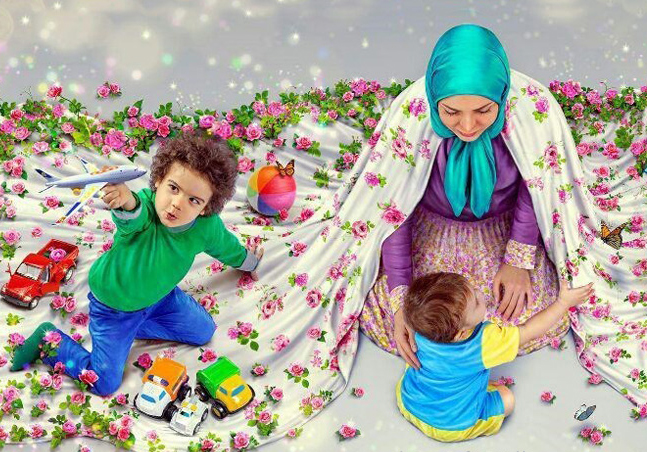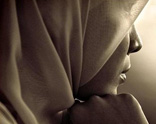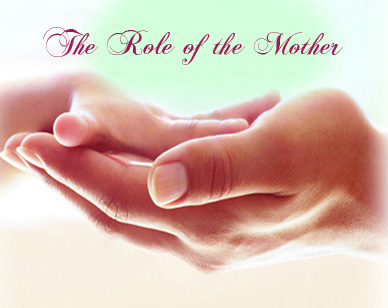Women’s Work and Struggle for God’s Sake
Woman’s Work
The works of the human being can in general be classified into three parts. The first one includes the personal works which are related to the peculiarities of the individual human being, such as: the worship which the human being performs for the sake of his/ her individual perfection, the care for some materialistic issues which are associated with the appearance and the possessions, etc.
The second one includes the works which have a familial dimension. These works are divided into subparts: Some of them aim at providing for the materialistic needs of the family i.e. the food, the drink, the clothes, etc. And some of them aim at supplying the family with the spiritual needs i.e. education, guidance, etc.
The third part includes the works which have a social dimension and which the human being performs in order to carry out his/ her positive role in the reformation of the society, improvement of its conditions, conformation to its circumstances, etc.
As regards the first part which includes the interest in the individual peculiarities, it is doubtless that the woman has the right to perform these works in general. Even more, this is desirable, for it is demanded that she cares about her appearance and that she adorns and improves it in front of her husband. It is also demanded that she cares about her special possessions without wastefulness, damage, loss, etc.
To be added is the worship which is regarded to be the aim of the existence of the human being: ﴾And I created not the jinns and humans except they should worship Me (Alone)﴿1.
As regards the third part, it is doubtless that the woman is assigned with a general social role which she must carry out: ﴾The believers, men and women, are Awlyia (supporters, helpers, friends, protectors) of one another, they enjoin Al-Maruf (i.e. Islamic monotheism, and all that Islam orders one to do) and forbid from AL-Munkar (i.e. polytheism and disbelief of all kinds, and all that Islam has forbidden); they perform the prayer and give the alms and obey Allah and His Messenger. Allah will have His Mercy on them. Surely, Allah is All Mighty All Wise﴿2.
The scope of this role may, in accordance to the woman’s capacities and the priorities governing her life in addition to the conditions of the society, widen to reach the entire nation or narrow to be included just within a specific frame.
Still to be discussed is the second part. It is doubtless that the woman has a major role as regards the supply of her children with the spiritual needs i.e. education, guidance, etc. But when the subject under discussion is the woman’s work, the question raised is related to the providing for the materialistic needs of the family by means of working outside the house in order to procure the livelihood. What is the attitude from this kind of work?
Woman’s Original Work
Islam did not assign to the woman the responsibility of procuring the livelihood for the family; on the other hand, Islam imposed this responsibility on the man. When The Prophet (God’s prayers and peace bestowed upon him and his Household) divided the work of the family between his daughter Sayyda Fatima (God’s peace bestowed upon her) and his son in law Imam Ali (God’s peace bestowed upon him), he assigned her with the work inside the house and him with the work outside the house.
This manner represents the healthy situation for the happy family where every member carries out his/ her special responsibility which adequates to his/ her personality and nature, in order that he/ she will complement with the other members in filling in the gaps and in procuring the materialistic and spiritual needs inside and outside the house.
In spite of this, Islam did not prohibit the woman’s work outside the house if this is within the correct religious rules. Even more, this work becomes preferable in some cases, among which we mention the following:
1- In Case of Financial Need
Seeking after the religiously permissible livelihood is regarded to be a worship as is ascribed to The Noblest Prophet (God’s prayers and peace bestowed upon him and his Household), “The worship is made up of seventy parts, the best of which is to seek after what is religiously permissible.”3
If the woman and those whom she provides for, in case there are persons whom she provides for, are in a financial need, it is doubtless that her work becomes preferred and demanded and will be better than that she be afflicted with poverty or be obliged to humiliate herself in order to get the help of the other people.
2- In Case of Free Time
Islam refuses free time and laziness. It is related in the narrative ascribed to Imam Musa Al-Kathem (God’s peace bestowed upon him) that he said, “The Most Glorious and Reverent God detests the servant who sleeps a lot and who has nothing to do.”4
In case a woman has a lot of free time to the extent that if she does not occupy them with work, she will be a conformation of the servant who sleeps a lot and who has nothing to do, then it is preferable for her to work.
3- A Special Importance Attached to Work
The work which the woman performs may be very important from the religious aspect, such as: the institutions which spread the religion among the people, which reform the society, and which are interested in the social work; or the specialization in the feminine medicine; etc. The woman may be occupied with these important works in order to serve the religion and the society, and she may receive money i.e. salary in exchange for the work she performs, so that she will live honorably and nobly.
These works, even though they procure a livelihood, basically aim at the service of the religion and the society; therefore, they remain to be preferred for themselves.
Abidance to the Religious Rules
The woman’s work must be within the frame of healthy environments which take into consideration the religious rules, among which two points are prominent:
1- The woman must turn away as much as possible from being with men at the same place. Also, she must abide by the religious veil. And she must consider the religious rules in her behavior.
Imam Al-Khomeini (May his secret be sacred) said in this course, “Let the woman work but while putting on the veil. There is no objection to her work in the governmental bureaus, but she must take into consideration the religious veil and the adherence to the religious rules.”5
2- If the work performed by the woman demands that she gets out of her house, she must get the permission of her husband in case she is married. According to the religious opinion of Imam Al-Khomeini (May his secret be sacred), “Her getting out of the house must be permitted by her husband.”
The Military Struggle for God’s Sake
Woman’s Role in the Struggle for God’s Sake
May the woman participate in the military work? Or is this kind of work exclusive to the man? If she is permitted to, is this permissibility restricted to certain works rather than other works or to certain kinds of struggle for God’s sake rather than other kinds?
We are going to reflect upon these issues each by itself, so that the picture will be clear and exact.
What Is Meant by Military Work?
The military work demands a huge effort covered by all those working in the field of struggle for God’s sake. It is, therefore, not restricted to the resistance who takes up the rifle and shoots the bullets towards the enemy directly, in spite of the fact that it represents the appearance and consequence and critical moment of the struggle for God’s sake.
Thus, the military work includes all the workers who provide the resistants with weapons at one hand; the workers who furnish them with food and clothes at another hand; the ambulance team who treats the wounds of the resistants, so that they will be able to go back to the arenas of confrontation at a third hand; in addition to a lot of missions which build up in order to enable the resistant to carry on by means of the consequence of this effort, to take up his weapon, and to direct the hits towards the enemies; etc.
It is, therefore, doubtless that the woman can participate in a lot of these missions. Even more, it is required from her that she covers such missions which support the front line and which provide for the resistants’ needs. The woman is considered to be a major reason for the continuation of the struggle for God’s sake. She can work in furnishing the resistants with food and clothes. She can be a nurse or a doctor who treats the wounds. She can as well help in all the logistic actions.
Moreover, it is well known in the Prophetic chronicle that the woman played a prominent role in the wars as regards supplying the fighters with food and the treatment of the wounds. Imam Al-Khomeini (May his secret be sacred) said, “In Sadr Al-Islam [The Rise of Islam], the women used to get out for wars, and most of them used to help the casualties and to treat the wounded all the time.”6
As regards the mission of taking up arms and the direct confrontation with the enemies, may the woman carry out this mission exactly as the men do? Is this imposed on her as a duty?
The Launching and the Defensive Struggle for God’s Sake
There are two types of the struggle for God’s sake: launching and defense. In the launching struggle for God’s sake, the battles take place on the lands of the others because of the Muslims’ invasion of these lands. In this time, we are not afflicted with this type of struggle for God’s sake. In the defensive struggle for God’s sake, the battles take place as a result of the enemies’ attack and their threatening of the Muslims.
Her Role in the Defense
The Most High God says, ﴾So their Lord accepted of them (their supplication and answered them), “Never will I allow to be lost the work of any of you, be he male or female. You are (members) one of another, so those who emigrated and were driven out from their homes, and suffered harm in My Cause, and who fought, and were killed (in MY Cause), verily, I will remit from them their evil deeds and admit them into Gardens under which rivers flow (in Paradise); a reward from Allah, and with Allah is the best of rewards﴿7.
It is the duty of all the responsible Muslims, whether men or women, to defend Islam and the Muslims and their countries. They must also participate in the defense by all the possible means. In case it is a defensive war, as is the case in this time, the woman’s role is not restricted to the logistic issues and the like; she has, if it proves to be necessary, to take up the arms and to fight.
Here comes the role of the diagnosis of the leader and his division of the roles in accordance to what the resistant and social interest he perceives. Imam Al-Khomeini (May his secret be sacred) related, “Some women came here and asked me to grant them the permission to go to Kurdistan in order to fight there. But I answered them, “This is not valid. The people and the army are carrying out their role there”8.
But if the leader perceives that it is necessary that the woman participate in taking up arms and in fighting, then she has to do so.
The Military Training
The Most High God says, ﴾And make ready against them all you can of power, including steeds of war (tanks, planes, missiles, artillery, etc) to threaten the enemy of Allah and your enemy…﴿9.
When the fight for God’s sake becomes a duty imposed even on the woman in order to defend Islam and the Muslim countries, it is requisite that she be ready to carry out this role which is assigned to her. If her religious role is fulfilled by fighting- as is the case in the case of defense where the fight of the men alone is not enough- then she must get the military training which provides the apparent reasons for victory, as The Most High God orders us to in the just mentioned noble verse.
In this course, Imam Al-Khomeini (May his secret be sacred) said, “When the defense is a duty imposed on everybody, the prerequisites of defense must be prepared too; included are the military training and learning of the fighting arts. The situation must not be that we must defend, but we do not know how to defend. It is obvious that the milieu where you train on the military arts must be a sound milieu, an Islamic milieu where chastity and all the Islamic issues are taken into consideration and maintained.”10
Islam did not assign to the woman the responsibility of procuring the livelihood for the family. In spite of this, Islam did not prohibit the woman’s work outside the house if it takes place within the frame of the correct religious rules.
Woman’s work outside the house may be preferred in some cases, among which we mention the following:
1- In case of financial need
2- In case of free time
3- A special importance is attached to the work in the institutions which spread the religion and the like
As regards the work which the woman performs, certain religious rules must be taken into consideration, among which two points are prominent:
1- The woman must turn away as much as possible from being with men at the same place.
2- The woman must get the permission of her husband in case she is married.
The woman can participate in a lot of military missions. She can work in furnishing the resistants with food and clothes. She can be a nurse or a doctor who treats the wounded. She can as well help in all the logistic actions.
It is the duty of all the responsible Muslims, whether men or women, to defend Islam and the Muslims and their countries, and the woman must be ready to carry out her role. Then, she has to get the military training which procures the apparent reasons for victory which The Most High God ordered us to procure.
1- When is a woman’s work outside the house considered to be acceptable?
2- What are the issues which the woman must take into consideration in case she works outside the house?
3- Is the woman permitted to participate in military work?
4- When is the fight for God’s sake imposed on the woman?
5- What are the issues which the woman must take into consideration during the military training sessions?
Om Salama: The Supporting and Fighting for God’s Sake Woman
Om Salama (May God be pleased with her) is the wife of The Noblest Prophet (God’s prayers and peace bestowed upon him and his Household). She represents the true portrayal of the steadfast belief and the fixed creed which was kneaded with the love of The Prophet (God’s prayers and peace bestowed upon him and his Household) and the support of his Household (God’s peace bestowed upon them).
God’s prophet (God’s prayers and peace bestowed upon him and his Household) preferred Om Salama to all his other wives, excluding Khadija (God’s peace bestowed upon her). She had the first place and the lofty rank, which none of the other wives, except Khadija (God’s peace bestowed upon her), had.
The life of this reverent lady was distinguished by her support to The Household (God’s peace bestowed upon them) in spite of all the political trends which aggressed against them and drove them away from the position in which The Most High God made them. She was characterized by the steadfastness to their authority and to the calling [of the people] for it. After The Prophet (God’s prayers and peace bestowed upon him and his Household) had passed away, she spent all the rest of her life in calling the people and in informing them about their [The Household’s (God’s peace bestowed upon them)] right, thus referring to what she had heard from God’s prophet (God’s prayers and peace bestowed upon him and his Household) as regards their right and prestige.
The Household (God’s peace bestowed upon them) used to respect her a lot and to esteem her so highly and honorably.
Om Salama, the woman who was carrying with her an old belief since the beginning of the call for Islam, was always aspiring towards the Pleasure of The Most High God. One day, she asked The Prophet (God’s prayers and peace bestowed upon him and his Household), “Why don’t we fight for God’s sake and attain martyrdom as the men do?” At that, The Most High God sent down the following noble verse: ﴾And wish not for things in which Allah has made some of you to excel others. For men there is reward for what they have earned, (and likewise) for women there is reward for what they have earned, and ask Allah of His Bounty. Surely, Allah is Ever Knower of Everything﴿11.
She (May God be pleased with her) defended Sayyda Fatima Al-Zahraa (God’s peace bestowed upon her). And because she did so, she was deprived of her allotted money [from the House of the Muslims’ money] in the same year she defended the daughter of God’s prophet (God’s prayers and peace bestowed upon him and his Household).
Moreover, she (May God be pleased with her) defended The Prince of the Believers (God’s peace bestowed upon him) and his true attitude in the Al-Jamal war. She gathered the women of Al-Mouhajereen [the immigrants] and Al-Ansar [the supporters] and informed them of her wrath from everyone who had got out fighting The Prince of the Believers Imam Ali ibn Abi Taleb (God’s peace bestowed upon him).
In addition to all of this, her history is filled with many attitudes which testify that she was from the women who fought for God’s sake and from the women who strove to raise the flag of Islam with all the might she had.




















